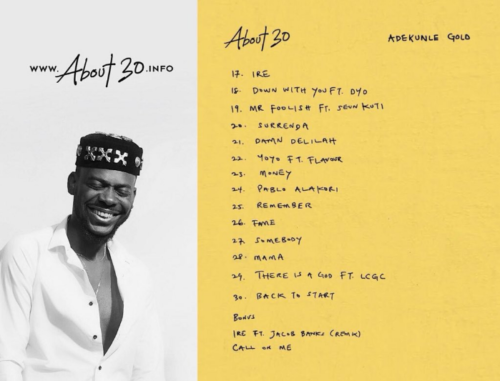To ascertain the genius of some artists, you wait for their debut albums. But for others, because the debut album was so good you doubt if the artist could do it again, you may say – let’s see how the sophomore album performs. Adekunle Gold has been at each of these points in his relatively young career.
The singer’s Gold album was a home run and hailed as a near-classic. In the months leading to the release of that album’s follow-up, About 30, Adekunle made a few promises; a key one is that About 30 would continue from where Gold stopped.

The urban highlife singer gave it his best shot.
This project is Adekunle Gold’s most personal project yet. It is a sort of entrance into the singer’s life, something only he could provide listeners access to. This is to say About 30 excels whenever the singer tells his story, unabashed. This is what happens on the opening song, “Ire”, where Adekunle Gold becomes a contemporary Baba Ara, of sorts, without sounding old-fashioned and pretentious.
If you listen to Adekunle Gold long enough, you may get the impression that all that happens in his life has to do with love, that’s how much the singer has milked sappy love themes. However, “Down With You” (with Dayo “Dyo” Olatunji) is not stained by this redundancy. The approach is different from most songs on Adekunle Gold’s catalogue, with Dyo’s assistance augmenting ‘Kunle’s voice to maintain the high-point the album opened with.
But “Mr. Foolish” is probably Adekunle Gold’s most visible attempt to step out of his comfort zone yet. “Mr. Foolish” puts Gold’s vocal flexibility to the test and the singer does well to outdo his limitations. Furthermore, Seun Kuti’s terse and direct lines have a pin-prick effect. The delightful combination of saxophones, spread-out snares and frequent cymbals make for an ultimate Afrobeat experience.
Another criticism of Adekunle Gold is monotony; much of his music is centered on the same kinds of melodies and progressions. This feeling of sonical dejavu is most obvious on “Surrender” & “Somebody”, which sound like something off his first album. Thankfully, the singer picks himself back up from this low to deliver an unforgettable gem in “Damn, Delilah”. This is the moment Adekunle Gold comes out of his cocoon. The frankness of his lyrics and the urgency with which he sings on “Damn, Delilah” are key in communicating his raw emotion. When Adekunle Gold opens up on “Damn, Delilah”, you felt that shit in your heart!
I used to think you took my breath away /
I lied, I was choking on your bullshit
— Adekunle Gold, “Damn, Delilah”
“Damn, Delilah” is where Adekunle Gold reaches the peak of his songwriting, an aspect in his music that does not quite excite on About 30.
At every 11-minute interval on About 30, you’ll hear Adekunle’s girlfriend and frequent collaborator, Simi in the background. She has become like a BOGOF (Buy-On-Get-One-Free) in Adekunle Gold’s music. Even though Adekunle places other artists on the project, he still gives Simi ample real estate. Oddly, on “Pablo Alakori” where Simi’s presence is most noticeable, Adekunle Gold falters. The song is inspired by the infamous Ibadan-based Twitter user, Pablo Ayodeji, who allegedly defrauded other Twitter users by claiming his ‘sister’ was dying of cancer and needed financial assistance. By presenting Pablo as the archetypal scammer, Adekunle is conveniently picking on a low-hanging Twitter fruit, while turning his back on the real life forests of Yahoo boys and G-Boys around.
Away from social commentary, “Fame” is a song of distress. There is distress in Adekunle Gold’s voice; it’s in in his words, and in the sullen guitar and soft drums. This is not a song to dance to. It is not a song you also want to skip. Something compels you to listen. “Fame” sparks moments of introspection. Co-written by teen sensation Efe Oraka, “Fame” is characteristic emotive writing by Oraka. For his part, Adekunle Gold owns the story and also bequeaths its ownership to the listener, no matter the level of attention the listener pays.
Everybody says don’t change /
But how will I grow? /
I’m scared to do the things I want /
But people don’t know /
I wanted the fame but I no know say the thing go hard /
— Adekunle Gold, “Fame”
In the final analysis, although About 30 is a worthy album, it is not above Gold. At best, the two albums are on the same level. Adekunle Gold found his place in Gold, and he chooses to remain in this same place on About 30. While there is noticeable growth in his sound – thanks to his band, the 79th Element – Adekunle’s songwriting did not grow. Therefore, About 30 is not an A album, it is a B record – at best – boosted to that level by the high scoring songs, “Fame”, “Damn, Delilah”, and “Mr. Foolish”, which are like 3- to 4-unit courses. Those were the songs that made the project memorable.
After leaving the bright lights and big records of YBNL behind, Adekunle Gold has managed to avoid the dreaded sophomore slump on About 30. The singer promised he won’t stop, what he didn’t tell us is he wouldn’t move very far ahead either.


